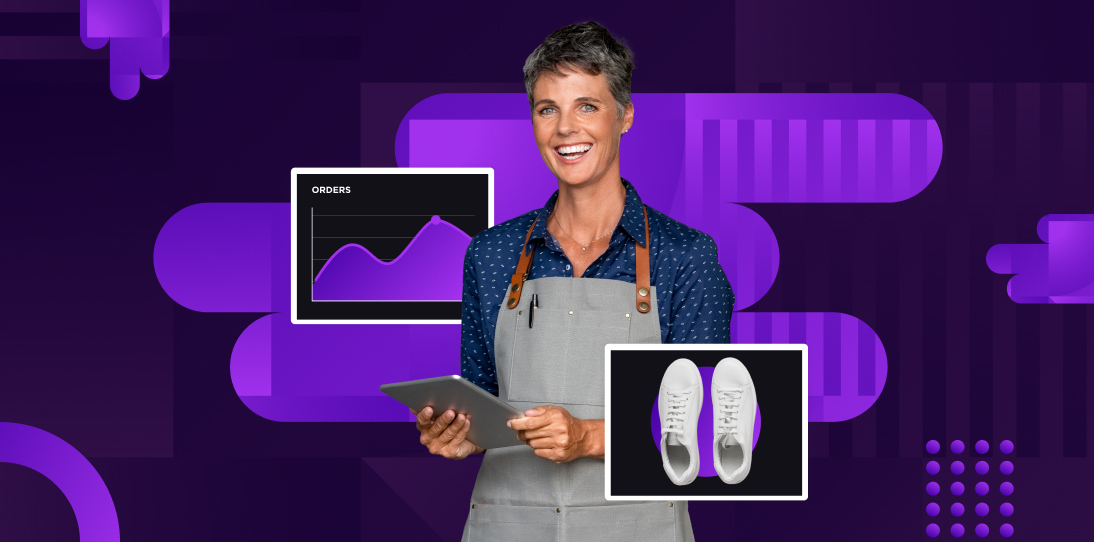- Enterprise
- Essentials
Ecommerce Acceleration Helps Push Online Sales to the Limit

Learn more about our modern, flexible ecommerce platform.
As the COVID-19 pandemic made readily apparent, if your ecommerce platform isn’t a heavy participant in the digital transformation, you’re working with a handicap. The pandemic, and the need to rely on digital platforms and channels, have created “faster” environments that offer opportunities to increase revenue.
This is at the heart of ecommerce acceleration, which applies data-driven technology to enhance revenue through all channels. It’s an approach that uses data science to scale ecommerce platforms up, quickly, and is becoming a standard for successful companies.
U.S. ecommerce sales surpassed $1 trillion in 2022. Getting a healthy piece of that pie takes a smart approach.
How Ecommerce Acceleration Works to Boost Business
Accelerators work based off a very simple formula:
Revenue = traffic x conversion x price
Implemented correctly, an ecommerce accelerator will maximize traffic and positively impact conversion rates by leveraging data to identify how the two correlate. This may include factors on- and off-page.
Here, an ecommerce accelerator helps ecommerce teams do more for less, maximize the value of available resources and positively impact revenue growth and profitability. This means the ability to scale up without overwhelming your team.
Replatforming Guide: A Roadmap for Migrating Your Ecommerce Store
Make your ecommerce replatforming project a success with our step-by-step guide filled with best practices from enterprise migration experts.
Download NowKey Concepts for Successful Ecommerce Acceleration
Respond to change quickly.
Life — and market changes — come at you fast. Customer demands can change suddenly and quickly. It’s on you and your platform to deliver them what they want.
Leveraging data can be a great asset here and actually identify market shifts before they happen. Being able to adapt your offerings or platform before sudden changes happen give you a leg up on the competition.
Build a culture of experimentation.
Never be afraid to innovate. Companies don’t become giants by always playing it safe. Cultivate a culture that isn’t afraid to take chances, even if it leads to failure.
Even failures can potentially be valuable and lead to the next big success. Provide incentives to employees to go out and try to do things that haven’t been done before.
Move fast, and be ok with failures.
Related to the above, fail and fail quickly. When you want to try something new that carries risk, attack it energetically. You may fail nine times, but the tenth attempt may be the success that transforms the company.
Always be optimizing.
Always test, measure and optimize your products and platform. This could be A/B testing on email subject lines or changes to products that fundamentally change what they do. You’ll never be done making things better.
Integrate learning into your company.
Optimizing doesn’t stop at products. Employees should be encouraged to expand their skill set and “optimize” themselves. Provide learning opportunities to add new skills or fund education to level up your own work force.
Focus on delighting customers.
Ecommerce acceleration should focus on the customer and what they want. Customer satisfaction is a primary business goal that tracks directly to the quality of the customer experience.
Utilize AI technology to bridge the gap.
Artificial intelligence and machine learning aren’t the answer to all your problems, but they can be a valuable tool for automation and even SEO.
Consider AI and ML aids that can help turn an average consumer experience into a good one, but cannot do this without a human touch.
Engage in an omnichannel strategy.
Modern ecommerce means selling through multiple channels at all times.
From social media platforms such as Facebook or LinkedIn to third-party ecommerce marketplace providers like Amazon or Walmart, you should be leveraging omnichannel selling to get your products in front of as many eyes as you can.
Implement real-time inventory management.
AI can actually help in managing your supply chain. Customers don’t want to buy an item and then be told that it’s not currently available.
How upset would the customer of an online grocery be if they purchased vegetables, elected to pick up in store and they’re not available upon arrival? Have an automated solution that keeps your sales channels updated and even orders items when inventory gets low.
Be data driven.
Let data be your decision-making guide. Leverage analytics and metrics to better understand your customers and their behavior, then make changes to your products and platform to deliver them what they want and how they want it.
Effectively Implementing an Ecommerce Acceleration Plan
Develop a detailed roadmap.
Don’t jump into ecommerce acceleration without having a plan. You should clearly define what you want to get out of this and have specific metrics and KPIs that will determine if you’re successful or not.
Have a well-researched project plan that shows what needs to happen and when, with a specific order of operations.
Choose the right technology to partner with.
It’s very likely that you’ll need to work with third-party vendors to give your front- and backends where you need them to be. From storage to data analysis to automation solutions, you’ll need to research and identify the tools that are best suited to meet your specific needs.
Have a skilled, built out ecommerce team.
Ecommerce acceleration isn’t easy. It comes with some specific pain points that even experienced developers may struggle with. Much like choosing the right technology, you’ll need to choose the right talent, preferably with ecommerce experience, to fit your needs.
Don’t forget about the international markets.
You can think locally, but you should be dreaming of global ecommerce. Even if your online shopping isn’t selling across borders yet, you should be setting up the shipping and payment systems that can do that in the future.
Not doing so intentionally limits your markets and stunts your ecommerce growth.
How BigCommerce Can Accelerate Your Ecommerce Business Growth
BigCommerce empowers brands to build cutting-edge ecommerce experiences — without compromising security, stability or scalability. The openness and power of the BigCommerce platform empower you to focus on optimizing your business for growth.
The Final Word
Ecommerce acceleration gives businesses a competitive advantage. By optimizing your website, making data-driven decisions, upgrading technology and making smart marketing decisions, you’ll get your products in front of more eyes and increase sales.
It’s an ongoing process that never has an endpoint, but an accelerator platform is the best way to keep up with a rapidly changing marketplace.
FAQs About Ecommerce Acceleration
How should enterprise businesses leverage AI and machine learning to aid in ecommerce acceleration?
AI is being leveraged in most parts of the modern ecommerce businesses. Chat bots can help improve customer service, fraud detection protects customers and the company and inventory management keeps products in stock.
This automation also has the benefit of freeing humans to do other, more impactful work.
How can enterprise businesses ensure a seamless omnichannel experience for their customers?
Using a platform like Feedonomics can help here.
Feedonomics, a BigCommerce partner, is the market leader in product feed management that lets you send your product data to more channels and synchronize it across systems.
Feedonomics helps sellers by automating product listing and order management, as well as optimizing product catalog data to improve search relevance and conversion rates. The ecommerce solution helps sellers resolve errors and maximize uptime by generating data feed error alerts to avoid disapproval and lost revenue.
Feedonomics services many of the world's most prolific online retailers and brands, including over 30% of the top 1,000 internet retailers. The platform also integrates with more than 160 online marketplaces, including Amazon, Walmart, eBay and social media platforms like Facebook and Instagram.
How can large-scale ecommerce businesses maintain brand consistency across various channels and platforms?
Using an omnichannel sales solution that pulls from a central asset depository helps. Instead of developing multiple assets to push out to channels one-by-one, you can create a single asset that is distributed to all channels, automatically.
This introduces stricter brand control and reduces the possibility of confusion.



